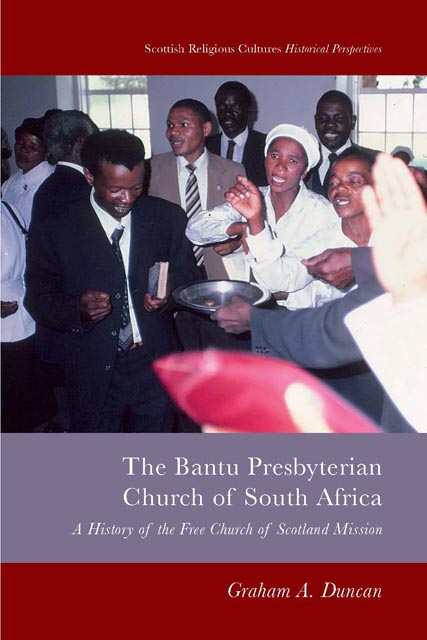Book contents
- Frontmatter
- Contents
- Acknowledgements
- Timeline
- A Presbyterian Anthem
- Introduction
- 1 Background to this Study
- 2 The Origins and Early Development of Scottish Presbyterian Mission in South Africa, 1824–65
- 3 Rev. Tiyo Soga (1829–71): A Paragon of Early Indigenous Leadership
- 4 The Role of Mission Councils in the Scottish Mission in South Africa, 1864–1923
- 5 The Rev. Edward Tsewu’s Dispute with the Free Church of Scotland Mission
- 6 The Mzimba Secession, 1898: A South African ‘Disruption’
- 7 Presbyterianism in South Africa, 1897–1923: To Unite orNot to Unite?
- 8 Preparations for the Formation of the Bantu Presbyterian Church of South Africa, 1897–1919
- 9 The Formation of the Bantu Presbyterian Church of South Africa, 1920–3
- 10 Mission to Church – Church to Mission: The First Ten Years, 1923–33
- 11 Reaching Out: The Bantu Presbyterian Church in South Africa and the Presbyterian Church of South Africa and Ecumenism, 1923–39
- 12 The Bantu Presbyterian Church in South Africa and Ecumenism, 1940–99
- 13 The End of Mission Councils: The Church of Scotland South Africa Joint Council, 1971–81
- 14 A Young Church in Mission or Maintenance Mode?: The Bantu Presbyterian Church of South Africa, 1923–99
- 15 The Bantu/Reformed Presbyterian Church and Socio-political Issues
- 16 Bantu/Reformed Presbyterian ChurchWomen in Leadership in Ministry
- Conclusion: Indigenous Presbyterians and Missionaries –Transferring Contending Roles and Responsibilities
- Bibliography
- Index
12 - The Bantu Presbyterian Church in South Africa and Ecumenism, 1940–99
Published online by Cambridge University Press: 26 November 2022
- Frontmatter
- Contents
- Acknowledgements
- Timeline
- A Presbyterian Anthem
- Introduction
- 1 Background to this Study
- 2 The Origins and Early Development of Scottish Presbyterian Mission in South Africa, 1824–65
- 3 Rev. Tiyo Soga (1829–71): A Paragon of Early Indigenous Leadership
- 4 The Role of Mission Councils in the Scottish Mission in South Africa, 1864–1923
- 5 The Rev. Edward Tsewu’s Dispute with the Free Church of Scotland Mission
- 6 The Mzimba Secession, 1898: A South African ‘Disruption’
- 7 Presbyterianism in South Africa, 1897–1923: To Unite orNot to Unite?
- 8 Preparations for the Formation of the Bantu Presbyterian Church of South Africa, 1897–1919
- 9 The Formation of the Bantu Presbyterian Church of South Africa, 1920–3
- 10 Mission to Church – Church to Mission: The First Ten Years, 1923–33
- 11 Reaching Out: The Bantu Presbyterian Church in South Africa and the Presbyterian Church of South Africa and Ecumenism, 1923–39
- 12 The Bantu Presbyterian Church in South Africa and Ecumenism, 1940–99
- 13 The End of Mission Councils: The Church of Scotland South Africa Joint Council, 1971–81
- 14 A Young Church in Mission or Maintenance Mode?: The Bantu Presbyterian Church of South Africa, 1923–99
- 15 The Bantu/Reformed Presbyterian Church and Socio-political Issues
- 16 Bantu/Reformed Presbyterian ChurchWomen in Leadership in Ministry
- Conclusion: Indigenous Presbyterians and Missionaries –Transferring Contending Roles and Responsibilities
- Bibliography
- Index
Summary
Introduction
Following the tensions which arose between the BPCSA and the PCSA, Xapile (1999: 98) was confident:
The challenge was to see the union in the context of the struggle of the oppressed who needed their freedom desperately before they could form unions and maintain such unions as equals with their oppressors. It was necessary to seek this union in South Africa so as for the church to witness as members of God's family. This would have brought a strong sense of credibility in a country where the church was also instrumental in dividing communities. A union would have created space and a forum for Christians to learn to speak and act together.
This was reached after a number of years of striving for a form of organic unity within Presbyterianism in South Africa. Xapile emphasised the political dimension of requirements to be met in order to give serious consideration to the question of union – political liberation was a prerequisite to uniting on the basis of human equality. This view was adopted by the BPCSA even before the institution of grand apartheid with its legislated and enforced policies of segregation. The other issue was that the BPCSA was still a young denomination and finding its way in mission and unity matters.
Onward Christian Soldiers
The 1941 General Assembly remitted the matter of union to the next assembly and distributed the draft basis of union to commissioners to Assembly (BPCSA 1942: 47); the 1942 General Assembly resolved that: ‘this matter be allowed to remain on the table until such time as the Bantu Presbyterian Church is sufficiently established to take its full share in such matters as Union with other Churches’ (BPCSA 1942: 23). Clearly the BPCSA would not be coerced into any union before it felt it had reached a stage of sufficient maturity to play its full part in any union. In 1944, the General Assembly received a notice of motion ‘That the Assembly review minute 1669 (BPCSA 1942: 23) with the object of opening negotiations with the Presbyterian Church of South Africa’ (BPCSA 1944: 13). This matter was not dealt with and remained dormant.
- Type
- Chapter
- Information
- Bantu Presbyterian Church of South AfricaA History of the Free Church of Scotland Mission, pp. 149 - 160Publisher: Edinburgh University PressPrint publication year: 2022



